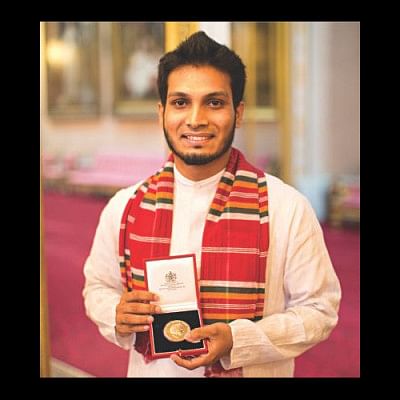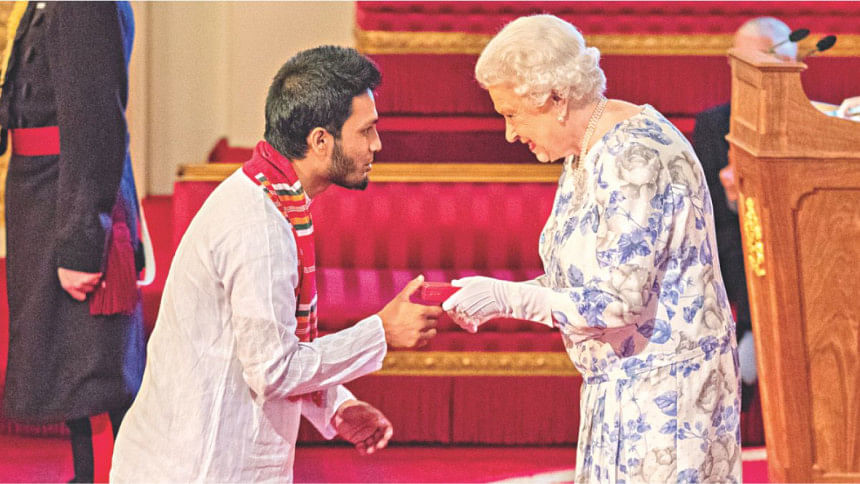An Ambassador of the Youth

Recently, Osama Bin Noor made headlines in Bangladesh, when he went to receive an award in Buckingham Palace, in the wearing traditional garbs – kurta, lungi and a gamcha. Not only did he carry the deshi attire in style, but also managed to impress the world with his ideas and work.
Osama won the 2016 Queen's Young Leaders Award – an award which is granted to young people (between the ages of 18-29) in the Common Wealth countries, working in the fields of development, human rights, environment etc. Osama was honoured with the prestigious award for his website – youthop.com – which aims to bring together global opportunities for the young in Bangladesh. "But now, many living abroad use the platform as well," says Osama, who has been running the website since 2012, with his team – co founder Makshud Manik, and members Muntaka Khan and Kazi Sumaita Nahar. "Because of the website, a lot of young people living in Bangladesh and abroad now have access to these opportunities, grants, internships and fellowship programmes, which otherwise many were not aware of."
His team at youthop.com consists of young men and women who work closely together. "Women are very dedicated towards their work," he says. "I had always felt that. I am glad we have a good team!"

Osama feels that life is a little better and easier, now that he has other benefits which came along with the Queens Award. He, along with the other winners, is now doing a distance learning course on Leading Change at Cambridge University. "This is one of the benefits that we get along with the award," says Osama. "The course helps us work on self-development, story telling and much more." While in the United Kingdom, the winners had also visited Cambridge University to attend a two-day workshop. "Every winner has a coach assigned to him or her," he says. "The coach would carry discussions with us regarding life, what we need to do, how to write a life story, how to speak to the public, how to approach the media and much more. The coach would guide us the way he or she would guide a player with a graph history and other resources. Even now we are in touch with our respective coaches. After a couple of weeks, a mentor has been assigned to each of us. We are now going to be under mentorship for the next 6 months. We will also get a certificate each at the end of the course."
In addition, the winners also had sessions with a top agency in the UK, Media Trust, who conducted workshops on social media, youth empowerment, spreading positive work, how to brand, how to tell a story etc. "We later went to a community radio station, where discussions were held on how to create awareness on different subjects making an impact in society. The BBC Academy held master classes on storytelling. In fact, my story was made an example, where we were further taught to relate and speak to the public. At the Twitter office, we were given classes on how to create and spread positivity on social media."
Osama Bin Noor, currently a third year student of Dental Surgery at Update Dental College, hails from the Madrasa stream of education in Bangladesh. He completed his Dakhil (SSC) from Tanjimul Ummah Cadet Madrasa and Aalim (HSC) from Tamirul Millat Kamil Madrasa. "I was in the science stream," he says. "We studied everything– starting from math, physics, chemistry, civics, social studies – all the subjects required in the general curriculum. Subjects such as the quran, hadith, fiqh and language were added to the curriculum. In fact, we studied three languages – English, Bangla and Arabic – speaking, writing and reading!"
Like most Madrasa students, Osama was isolated at one time, refusing to mix with people outside his comfort zone. "Many young people my age felt differently about madrasah students," he says. "I was particularly afraid to mix with the English medium students. But after I joined Jaago Foundation for their UCD programme and also completed a 4-month leadership training at BYLC, I began to change." Becoming a part of both these youth organisations was a turning point for Osama. In fact, Osama was all the more relaxed when he found people his age treating him normally at Jaago Foundation and not creating the divide that he usually felt.
Osama, along with three other young people, host a show on Colours FM, where teenagers call in or send text messages, looking for guidance and answers. "These children remain anonymous and share their problems with us," says Osama. Every Tuesday from 11 pm - 1 am, the show 'Teen Tekka' offers advice, advocacy and sometimes shares a joke or two. "We are more like older siblings or friends on the show and we encourage the teenagers to speak up and not hold back anything," says Osama. "Over the last one year, I have come across young people who are vulnerable," adds Osama. "Through our show, we have been talking to young people who were probably bullied, sexually harassed and having problems with friends, relationships and also parents. These young people tend to isolate themselves from the world, because nobody seems to understand them or their problems. That's when certain segments of the society take advantage of their loneliness, their isolation and fill in the gaps with hate speech, with negative encouragement and finally lure them to committing crime. That's when these youngsters start thinking about destruction. They need someone to talk to them, to share their ideas, to uplift and encourage their ideas to come out in the open for acknowledgment and appreciation."
According to Osama, young people need to be motivated. Officials and professionals need to go and speak to young people and motivate them, inspire them, and guide them. "There are so many opportunities in the country," he says. "But because of certain complexities involved in the process, not many have access. For instance, the ICT ministry had begun a cprogramming and coding contest. But not many knew about it. Only one or two groups of people would end up participating in all these contests!"
It is often said that Bangladesh, today, does not have, heroes and leaders, the young can look up to. Yes, we do have our youth organisations, the winning sportsmen, the courageous mountain climbers, and of course the liberation war heroes from 1971 and beyond. However, the young minds are hungry for may more idealistic heroes who they can follow and showcase as examples. After all, becoming global citizens is not an easy task!

 For all latest news, follow The Daily Star's Google News channel.
For all latest news, follow The Daily Star's Google News channel. 



Comments